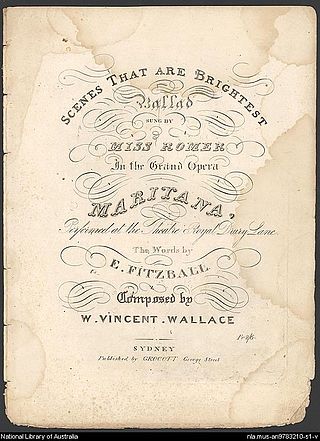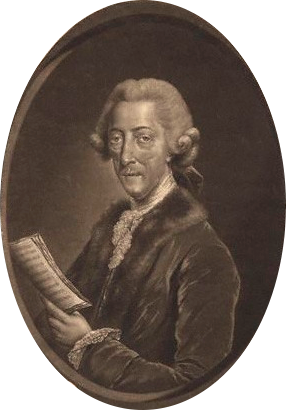
Michael William Balfe was an Irish composer, best remembered for his operas, especially The Bohemian Girl.

Semele is a 'musical drama', originally presented "after the manner of an oratorio", in three parts by George Frideric Handel. Based on an existing opera libretto by William Congreve, the work is an opera in all but name but was first presented in concert form at Covent Garden theatre on 10 February 1744. The story comes from Ovid's Metamorphoses and concerns Semele, mother of Bacchus. Handel also referred to the work as 'The Story of Semele'. The work contains the famous aria "Where'er you walk".

William Vincent Wallace was an Irish composer and pianist. In his day, he was famous on three continents as a double virtuoso on violin and piano. Nowadays, he is mainly remembered as an opera composer of note, with key works such as Maritana (1845) and Lurline (1847/60), but he also wrote a large amount of piano music that was much in vogue in the 19th century. His more modest output of songs and ballads, equally wide-ranging in style and difficulty, was also popular in his day, some numbers being associated with famous singers of the time.

Alfred Bunn was an English theatrical manager. He was married to Margaret Agnes Bunn, a minor actress, in 1819.

Hamlet is a grand opera in five acts of 1868 by the French composer Ambroise Thomas, with a libretto by Michel Carré and Jules Barbier based on a French adaptation by Alexandre Dumas, père, and Paul Meurice of William Shakespeare's play Hamlet.

The Two Widows is a two-act Czech opera by Bedřich Smetana based on the libretto of Emanuel Züngel. The libretto is based on Jean Pierre Felicien Mallefille's one-act play Les deux veuves. The opera was composed between June 1873 and January 1874, and its premiere took place on 27 March 1874 at the Prague Czech Theatre under the direction of Smetana. However, this premiere was not successful and the opera was rewritten in 1874. The spoken dialogue was replaced by through-composed recitatives and some of the music and characters were reworked. The second premiere on 20 October 1874 was very successful. A further revised version was premiered on 17 March 1878, under Adolf Čech.

Belshazzar is an oratorio by George Frideric Handel. The libretto was by Charles Jennens, and Handel abridged it considerably. Jennens' libretto was based on the Biblical account of the fall of Babylon at the hands of Cyrus the Great and the subsequent freeing of the Jewish nation, as found in the Book of Daniel.
The Picture is a Caroline era stage play, a tragicomedy written by Philip Massinger, and first published in 1630.

Maritana is a three-act opera including both spoken dialogue and some recitatives, composed by William Vincent Wallace, with a libretto by Edward Fitzball (1792–1873). The opera is based on the 1844 French play Don César de Bazan by Adolphe d'Ennery and Philippe François Pinel (Dumanoir), which was also the source material for Jules Massenet's opéra comique Don César de Bazan. The opera premiered at the Theatre Royal, Drury Lane on 15 November 1845.
Il pesceballo is a 19th-century American pasticcio opera in one act featuring the music of Bellini, Donizetti, Mozart, and Rossini, with a spoof Italian libretto by Francis James Child which makes use of some of grand opera's most popular melodies. The recitatives and chorus parts were written by John Knowles Paine, and James Russell Lowell translated the libretto into English.

Eliza is an opera in three acts by the composer Thomas Arne to an English libretto by Richard Rolt. The opera was premiered in London at the New Theatre in the Haymarket on 29 May 1754.
The Snow Queen is a chamber opera in six scenes and a prologue by Matthew King. The libretto, by Andrew McKinnon, is based on the original 1844 allegorical fairy tale by Hans Christian Andersen. The opera was composed in 1992 for the British soprano Jane Manning who sang the title role in the first performance with Pal Rullestad (tenor) and Tracy Chadwell (soprano) in supporting roles. The work also has significant roles for two young singers as Gerda and Kay, the heroic children in the story and a chorus of treble voices. The work is scored for a small ensemble of eight players with conductor: string trio, flute/piccolo/alto flute, clarinet/bass clarinet, piano/celesta and percussion. The pianist also has to play a melodian. At one point, the conductor is required to play a French horn. The wide-ranging musical narrative involves a plethora of musical styles. A review of the first performance described King as being "like a bright Hollywood composer with a sense of humour" and, after a subsequent performance at the Queen Elizabeth Hall in London, another reviewer suggested that the opera contained '"music of distinctive beauty with disarming theatre sense.'"

The Amber Witch is an opera in four acts composed by William Vincent Wallace to an English libretto by Henry Fothergill Chorley, after Lady Duff-Gordon's translation of Meinold's Maria Schweidler: Die Bernsteinhexe.

Lurline is a grand romantic opera in three acts composed by William Vincent Wallace to an English libretto by Edward Fitzball. It was first performed on 23 February 1860 at the Theatre Royal, Covent Garden by the Pyne and Harrison English Opera Company with Louisa Pyne in the title role. The libretto is based on the legend of the Lorelei.
William Michael Rooke was an Irish violinist and composer.

The Rose of Castille is an opera in three acts, with music by Michael William Balfe to an English-language libretto by Augustus Glossop Harris and Edmund Falconer, after the libretto by Adolphe d'Ennery and Clairville for Adolphe Adam's Le muletier de Tolède (1854). It was premiered on 29 October 1857, at the Lyceum Theatre, London.

William Harrison was an English tenor and opera impresario. He was best known for creating roles in new operas by British composers from the 1840s to the early 1860s. Among those who composed for him were William Vincent Wallace, Michael William Balfe and Julius Benedict. After working for Alfred Bunn at the Theatre Royal, Drury Lane, Harrison set up a company in partnership with the soprano Louisa Pyne, which enjoyed success in North America and London in the 1850s.

Semiramide riconosciuta is a dramma per musica in two acts by Giacomo Meyerbeer. It is the composer's fifth opera and the second that he composed for a theatre in Italy. The text is an adaptation of a pre-existing libretto by Pietro Metastasio that had already been set to music by numerous other composers. The opera had its premiere at the Teatro Regio in Turin on 3 February 1819.
Arsinoe, Queen of Cyprus by Thomas Clayton was the first Italian-style opera to be staged in England. It premiered at the Theatre Royal, Drury Lane on 16 January 1705. There were various historical women named Arsinoe, but from the mid seventeenth-century the name became popular for fictional characters who, like the title-role of this opera, bore no relation to any of them.

Elizabeth Poole (1820–1906), was a British opera and concert soprano singer and actress of the 19th century.














